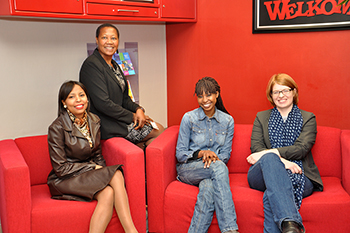Latest News Archive
Please select Category, Year, and then Month to display items
07 January 2018
Photo Charl Devenish
 Dr Anneke van der Spoel van Dijk is invested in contributing
to the global effort of stopping TB by 2035.
Dr Anneke van der Spoel van Dijk is invested in contributing
to the global effort of stopping TB by 2035.
The work of Dr Anneke van der Spoel van Dijk investigates the spread of TB in the Free State population using techniques such as next generation sequencing, spoligotyping and MIRU-VNTR typing. Dr Van der Spoel van Dijk, a senior medical scientist in the Department of Medical Microbiology at the University of the Free State (UFS) also looks at drug resistance in her research. This work informs decisions about how best to treat patients with multidrug-resistant TB (MDR-TB).
She employs rapid molecular techniques to track one of Africa’s most serious diseases, tuberculosis (TB).
Drug resistance
Scientists assist the National Health Laboratory Service and Department of Health in trying to refine the diagnostic tools to identify these cases earlier. Dr Van der Spoel van Dijk explains: “Until recently, it took up to two years to fine-tune treatment decisions for patients with MDR-TB. Patients get a cocktail of anti-TB drugs, but it takes time to find the right combination. Re-infection and relapse (patients stopping treatment for several reasons) add to the diagnostic and treatment management challenges.
Enormous impact
“Now doctors can reduce the time needed for diagnostic certainty to about seven days, while new drugs allow reduction of treatment from more than 18 to nine months. This can have an enormous impact on the life of many patients.”
Dr Van der Spoel van Dijk’s work forms part of research in the faculty looking at resistance development in TB strains. She is currently also doing her doctoral thesis on the differences and incidence of MDR-TB among adolescents versus adults. Dr Van der Spoel van Dijk says: “It is a complicated picture, but we hope to unravel it to support better diagnostic tools and patient care.”
As part of the National Health Laboratory Service, her department is playing an important role in TB diagnostics and the training of scientists and future pathologists. “Our work is contributing to the global vision to stop TB by 2035,” Dr Van der Spoel van Dijk says.
UFS outperforms SA higher education in EU-Saturn programme
2016-12-14

Partnering between the UFS and other institutions
makes it possible for staff and students to study abroad.
Pictured from left front, are: Mareve Biljohn (EU-Saturn
at University of Groningen), Memory Mphaphuli (INSPIRE
at University of Ghent) and Wanda Verster (EU-Saturn at
Uppsala University). Back: Moliehi Mpeli (Erasmus Mundus
at University of Leuven).
Photo: Stephen Collett
The University of the Free State (UFS) strives to invest in its staff and students and a proven example can be seen in the latest cycle of the Erasmus Mundus EU-SATURN programme.
The UFS outperformed the higher education sector over the past five years as it had more exchange scholarships than most South African universities. A total of 16 (18%) out of the 89 local scholarships allocated until 2016 were from UFS. Stellenbosch University, with 14 scholarships, was second.
University one of main roleplayers
Chevon Jacobs, Senior Officer said: “Internationalisation at the UFS is a great achievement as the university allocated all available scholarships to eligible staff and students. She said the strong partnership history between the university and some European institutions, due to a similarity between the language and culture of especially Dutch-speaking countries, is one of the reasons for the success.
“We are very proud of our participation. We have invested for these predominantly young members to spend time abroad in furthering their qualifications,” she said.
The EU-Saturn project has been jointly co-ordinated for the past five years by the University of Groningen, Netherlands, and the UFS.
One of few projects funded by Erasmus Mundus
The Erasmus Mundus is an international partnership aimed at enhancing the quality of European higher education and the promotion of dialogue and understanding between people and cultures through co-operation with other countries. The EUROSA, EU-Saturn, Aesop and INSPIRE to name a few, are all programmes funded by the European Union through the Erasmus Mundus. These projects offer fully funded part-time or full-time postgraduate scholarships for study in Europe.
Some of the universities UFS students have studied at are the University of Groningen, the University of Newcastle, England, and the University of Ghent, Belgium.
Successful UFS grantees awarded scholarships over the past five years:
• Maria Campbell (2014 – PhD) – University of Newcastle
• Sethulego Matebesi (2014 – PhD) – Uppsala University
• Lindie Koorts (2016 – PhD) – University of Groningen
• Reginald Makgoba (2013/2014 – Master’s) – University of Newcastle
• Sanet Steyn (2013/2014 – Master’s) – University of Groningen
• Johnathan Adams (2015/2016 – Master’s) - Göttingen University
• Eben Coetzee (2013/2014 - PhD) – University of Groningen
• André Janse van Rensburg (2013/2014 – PhD) – University of Ghent
• Martin Rossouw (2013-2015 – PhD) – University of Groningen
• Jan Schlebusch (2013-2016 – PhD) – University of Groningen
• Carel Cloete (2014-2016 – PhD) – University of Groningen
• Nadine Lake (2014-2016 – PhD) – Uppsala University
• Elbie Lombard (2014-2016 – PhD) – University of Ghent
• Luyanda Noto (2014/2015 – PhD) – University of Ghent
• Mareve Biljohn (2015/2016 – PhD) – University of Groningen
• Wanda Verster (2015/2016 – PhD) – Uppsala University